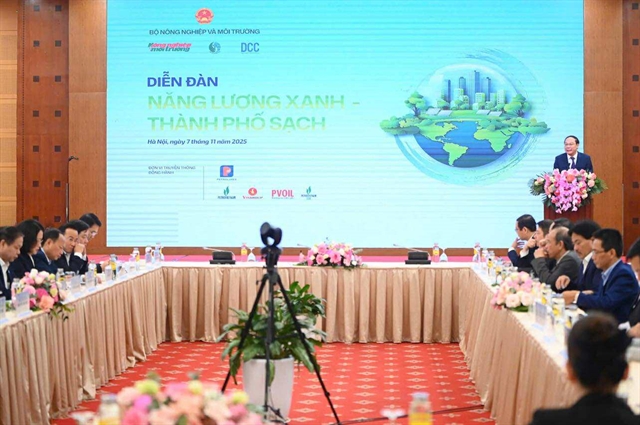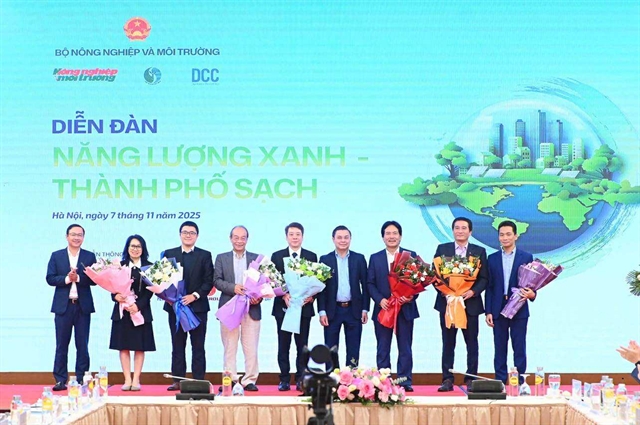 Environment
Environment

 |
| Participants discuss various solutions to promote energy transition and the development of green transportation infrastructure at the forum “Green Energy – Clean Cities” on Friday. VNS Photo Tố Như |
HÀ NỘI Green development is no longer a trend, but an essential requirement in the context of the world facing energy and environmental crises, said Deputy Minister of Agriculture and Environment Lê Công Thành.
According to the official, Việt Nam has showed its strong commitment to climate action through a range of policies incuding the Law on Environmental Protection 2020, National Strategy on Climate Change and action plans for reducing greenhouse gas emissions and adapting to climate change adaptation, towards the country’s 2050 net-zero emissions target.
“These policies not only demonstrate Việt Nam’s commitment to the international community but also serve as legal foundations and directions for domestic energy transition and green growth,” Thành told the forum “Green Energy – Clean Cities” jointly organised on Friday by Nông nghiệp và Môi trường (Agriculture and Environment) newspaper and Department of Climate Change under the Ministry of Agiculture and Environment.
The event enabled experts, policymakers, and businesses to discuss various solutions to promote energy transition and the development of green transportation infrastructure, contributing to the commitment of achieving net-zero emissions by 2050.
“Developing clean energy is the key to achieving emission reduction goals, ensuring energy security, and improving people's quality of life. The use of clean energy, clean fuels, and the development of green transportation systems is an urgent requirement, especially in major cities such as Hà Nội, Hồ Chí Minh City, Hải Phòng and Đà Nẵng where population density and vehicle numbers are high, and air pollution levels frequently exceed permissible limits,” said Thành.
He called on all sectors of society from governing bodies and busineses to local communities to unite in building a green future with liveable, clean and sustainable cities.
"Việt Nam has both the capability and determination to build green, clean, and livable cities—places where people can enjoy fresh air, a safe environment, and prosperous development. With the collective efforts of the entire society, the transition to clean energy and the development of green transportation will not only be a goal, but a concrete action contributing to a sustainable future for the country," Thành said.
Air pollution in Việt Nam is currently concentrated mainly in the two key economic regions of the North and South. Monitoring results show that PM2.5 fine particulate levels rise significantly during the dry season, especially in areas with high traffic density. The main sources of pollution stem from transportation, construction, industrial activities, and the burning of household waste.
The Ministry of Agriculture and Environment is finalising a roadmap to implement emission standards for circulating motorcycles and mopeds.
The plan is expected to be rolled out gradually, starting in major cities such as Hà Nội and Ho Chi Minh City in 2027, before expanding to other localities. This policy is anticipated to mark a significant shift in emission control efforts, while also encouraging the public to adopt electric vehicles and clean energy solutions.
 |
| The forum's organisers present flowers to speakers. |
From an urban planning perspective, Deputy Director of the Academy for Strategy and Capacity Building in Construction (Ministry of Construction) Lê Văn Đạt emphasised that green transportation plays a pivotal role in the goal of building “clean cities.”
“Hà Nội and HCM City currently have the highest levels of air pollution in the country, primarily caused by emissions from personal vehicles. Motorbikes have been identified as the largest source of emissions, contributing significantly to hydrocarbons, carbon monoxide (CO), and PM10 fine dust in urban air,” Đạt said, proposing a comprehensive set of solutions, ranging from investment and financial mechanisms to policies that encourage the public to adopt green vehicles.
He suggested that the public-private partnership (PPP) model should be flexibly applied in the construction and operation of public transportation systems, especially urban railways and electric buses. The Government should introduce investment incentives and support enterprises in developing charging station infrastructure, while recognising charging stations as part of the transportation infrastructure to facilitate planning.
In addition, he recommended reducing corporate income tax, offering interest rate support for green infrastructure investment projects, expanding bus fare subsidies for students and workers, and organising a “Green Mobility Day” to encourage the use of public transport.
In the energy sector, Deputy Director of the Electricity and Renewable Energy Authority (Ministry of Industry and Trade) Trần Hoài Trang stated that the revised Power Development Plan VIII sets a target to increase the share of renewable energy to 28–36 per cent by 2030 and 74–75 per cent by 2050, while reducing greenhouse gas emissions from the power sector to around 27 million tonnes by 2050. Việt Nam is aiming to build a smart grid that efficiently integrates renewable energy sources such as wind power, solar power, biomass, hydrogen, and green ammonia.
From the perspective of the petroleum industry, Vice President and Secretary General of the Vietnam Petroleum Association Nguyễn Hùng Dũng said that modern cities aspiring to become hubs of innovation, finance, and international trade must develop a green and low-emission energy ecosystem.
At the forum, Editor-in-Chief of the Agriculture and Environment newspaper Nguyễn Ngọc Thạch emphasised that the event’s goal was not only to exchange policies and technologies, but also to spread the spirit of action for a green future.
“When every city, every business, and every citizen becomes conscious of saving energy, switching to clean vehicles, and reducing emissions, the idea of a “clean city” will no longer be just a slogan, but a vibrant reality,” said Thạch. VNS




